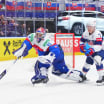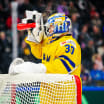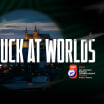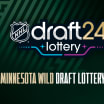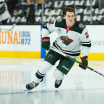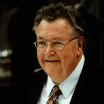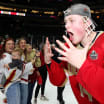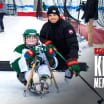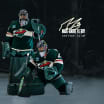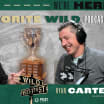Late night hockey played by amateurs in local rinks has earned the nickname of "beer league" hockey for years, and for good reason.
It's not uncommon for players to bring in a case of beer to share with teammates after an hour of camaraderie and fun on the ice.
But "beer league" hockey isn't always the most inclusive of environments for people that are alcoholics or are in recovery. That's why the recovery community went about creating its own hockey league.
Upcoming Recovery Night a celebration of battles won, ones that lay ahead
Twin Cities alcohol and drug recovery community will come together for fellowship and fun at Wild game on Jan. 5
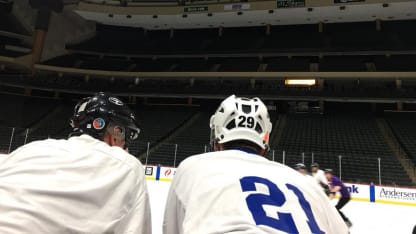
Folks that play Recovery Community Hockey, or RC Hockey as it's called, aren't anti-alcohol and they don't dislike people that choose to enjoy it. They simply want a safe environment to play the sport they love, without the feeling of judgement. Connection and celebration of recovery are two of the prime reasons why the league exists.
The idea for a dry hockey league came about a few years ago and is modeled after a sober softball league in St. Paul that has been around since the 1980s. There are 40 teams that participate in the league each summer, so the thought was, why not have a similar opportunity for people in the winter months?
Now in it's fourth season, this free weekly pick-up skate at Drake Arena on the St. Paul Academy Campus, has become a staple in the Twin Cities recovery community. It has facilitated a greater connection point for many, building a foundation in recovery and providing a safe, sober hockey experience.
"That's how big the recovery community is in the Twin Cities," said Doug Anderson, the Evening Program Coordinator at The Retreat, a Wayzata-based program which uses a non-clinical, mutual help approach to the problem of alcohol and drug dependency. "Long-term goals, there are some thoughts on how to do this. Right now, we're trying to make this a comfortable place for people who are in recovery and are also in the hockey community."
A connection between Recovery Community Hockey and the Minnesota Wild led to the creation of first Minnesota Wild Recovery Night in 2018. On Jan. 5, the Wild will host its third-annual Recovery Night when the Wild plays the Calgary Flames. Started two years ago, Recovery Night is an event that brings together people affected by alcoholism and addiction for a celebration of recovery and fellowship.
A meeting is held at RiverCentre before the game, where this year's keynote speaker, former Pittsburgh Penguins star Kevin Stevens will address the crowd, before they move next door and take in a hockey game.
It offers an opportunity for many people in recovery to enjoy hockey in a safe environment, when they might otherwise feel uncomfortable in a setting so dominated by alcohol. Even for those not in recovery, it is a celebration of the journey that everyone in the group has experienced.
"There are a number of people who don't feel comfortable going to sporting events yet," said Wild Senior Premium Service Executive Jared Jenkins.
With the help of Jenkins and only word of mouth advertising in the recovery community, the night's popularity has grown each season.
Launched with an initial goal of attracting 50 people to the first event in 2018, more than 200 showed up.
Last year, more than 500 people showed up to listen to former NHLer Derek Sanderson as the featured speaker.
Stevens' backstory is fascinating and could again break an attendance record.
The life of Stevens was changed forever on May 14, 1993. It was on that day that he and his Pittsburgh Penguins teammates were playing in Game 7 of the Patrick Division Finals.
Early in the first period, Stevens checked New York Islanders defenseman Rich Pilon, but knocked himself unconscious when he hit Pilon's visor.
Out on his feet, Stevens hit the ice face first with nothing to break his fall. Most of the bones in his face were shattered, and he required extensive surgery to reconstruct his face with metal plates.
Doctors would make an incision below his hairline from one ear to the other, eventually closing it with more than 100 stitches.
The injury didn't end Stevens career, but for the following two decades, Stevens would be addicted to both prescription and recreational drugs. That addiction cost Stevens his marriage and his post-playing career in the game he grew up playing in the Boston suburbs.
In the four years before the incident, Stevens averaged 40 goals and nearly 100 points. He was never able to come close to those kinds of numbers after drugs took over his life.
"He went from two-time Stanley Cup champion," Jenkins said, "to facing federal prison. It's crazy, the downfall of him."
Alcohol and drug abuse has effected countless former and current players, many of whom choose to keep that battle private.
After being involved in a car accident that nearly took his life, one that happened with him high behind the wheel, Stevens finally took control of his life four years ago and has remained sober.
Part of his sentencing was to share his story with young people, and he's enjoyed it so much that he's continued to do so even after his debt to society has been paid.
On Jan. 5, before the Wild plays the Flames, Stevens will be on hand to share his own story -- both his downfall and his current fight -- with members of the Twin Cities' recovery community.
For more information on the event, or to purchase tickets as part of Recovery Night, visit
wild.com/recovery
. For questions or to purchase a group of eight or more tickets, contact Jenkins at 651-312-3437 or [email protected].
"This disease, it ruins families. It kills people," Jenkins said. "It's no joke, and these people have lived it. It hits everyone in that room, so we encourage everyone to be a part of it."

